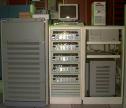
RAID servers distribute their data across a number of hard disks. It is therefore very important that any data loss situation is dealt with correctly.
Inexperienced ‘specialists’ will often inadvertently destroy recoverable data because they lack the experience to recover these complex systems correctly.
Servers and RAID arrays often store lots of important data. The server may be a large RAID 5 system that holds lots of important company files and databases or it may be a home NAS server that contains equally important personal and family data.
These systems fail infrequently, but when they do it’s imperative that the correct action is taken in order to access the system and recover the data. This is often the most important part of the entire process and doing it wrongly will lead to the permanent loss of data that can no longer be retrieved.
What Makes Recovering RAID Data So Difficult ?
Typically the data you wish to recover will be written across all the disks that make up the RAID array. From a data recovery angle, this typically means that complete individual files will not exist on any one disk, but rather segments of each file will be distributed across the whole RAID array. It’s therefore pointless (unless you are trying to recover data from a mirrored raid [RAID 1]) to attempt to isolate a single drive from the array and recover that.
5 Golden Rules of RAID Data Recovery
- DO NOT change the disk order of the array: It’s very important not to change the order of the disks in the RAID array. Infact, unless you have a physical problem with one or more disks in the array, you shouldn’t need to remove them from the server. If you do remove them, it is vitally important that you put them back in the same order. Under no circumstances should you attempt to recover the data from a RAID array if the drive order has been compromised. You run an extremely high risk of losing all the data.
- DO NOT run disk checking software on the array: Scandisk and Chkdsk are programs that often run automatically if a problem with the filesystem is detected. Unfortunately, these programs are unable to deal with physical damage to hard disks, and even more unfortunately, rather than terminate, they will carry on and attempt to fix any problems. For further information, please read our page detailing why it’s not a good idea to run scandisk / chkdsk on raid arrays.
- DO NOT continue to run the system if one or more of the hard disks appear faulty: If the RAID / SCSI BIOS reports that one or more drives are not functioning correctly, you may have a physical drive problem. Sometimes however, the BIOS will indicate that drives are offline not because of a physical disk problem, but rather because of a RAID configuration problem.
- DO NOT re-configure the RAID: If there does not appear to be a problem with the RAID configuration, there is no need to write any new configuration data. If the configuration information has been lost or corrupted it’s imperative that the RAID is re-configured correctly.
- DO NOT rebuild the RAID: If any of the points above apply or you are uncertain about the viability of your data, DO NOT REBUILD THE RAID. If any of the hard drives that make up the RAID have bad sectors DO NOT REBUILD THE RAID – attempting to rebuild a RAID that has drives with bad sectors will cause the whole rebuild process to fail and lead to a significant amount of data loss.
